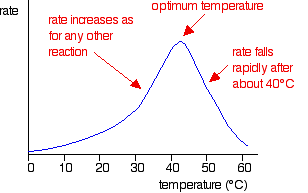Hey's People, I'm back after a break, if you can see the timing. But anyways, here's the 2nd part of the mighty digestion! (Y) The.....*Drum Roll Please*.....Enzymes! (Y)
Anyway, Enzymes are really simple to understand, but you have to remember a lot of things, but if you write it all out on 1 piece of foolscap paper, I guess you'll remember it better, by a lot, so anyways, good luck!
So Here's the Definition of enzymes.
Enzymes are Proteins. (Please remember that) They are biological catalysts that help speed up the rate of chemical reactions without themselves being broken down at the end of the reaction. (How cool is that?)
Enzymes - Conditions
Yes, there are conditions, like the T&Cs that we humans have. There are 2 main conditions for the best enzymes reactions, and I think you'll find it easy to remember. :)
1. Optimum Temperature
It basically means the temperature at which the enzymes works best in, which is room temperature of about 37 degrees or so (plus minus) and some questions usually states 40 degrees, which is also considered. At this temperature - room temperature - the enzymes reactions with the substrate is at it's peak, but after that temperature, the enzymes would slowly denature, meaning that the reactions would become slowly, and the enzymes would slowly die.
However do please take note that in scientific terms, the enzymes do not die but denature.
2. pH Values
Sorry to say that we have not learnt Chemistry as we would be learning it the next term, but I guess it is just the acidity and the alkaline, and in this case, it is the pH values of the enzymes.
salivary amlase works best in pH7
protease works best in pH2
lipase works best in pH 7~8


